Education Systems: Comparative Analysis of Germany, England, and Wales
VerifiedAdded on 2022/08/25
|11
|3196
|22
Essay
AI Summary
This essay undertakes a comparative analysis of the education systems of Germany, England, and Wales, focusing on the expansion of school privatization. It delves into historical, social, and political factors, examining the influence of partisan politics and institutional frameworks. The essay explores financial contributions, policy goals, and organizational structures, including insights from Sweden and Japan. It highlights the differing approaches to egalitarianism and the impact of privatization on educational equality. The comparison reveals how these nations have addressed school privatization and the implications for their education systems. The essay also explores the roles of key political parties, such as the SPD in Germany, and their impact on economic contributions to school privatization. The analysis provides a comprehensive overview of the complex dynamics shaping education in these countries.

Running head: EDUCATION STUDIES
EDUCATION STUDIES
Name of the Student:
Name of the University:
Author note:
EDUCATION STUDIES
Name of the Student:
Name of the University:
Author note:
Paraphrase This Document
Need a fresh take? Get an instant paraphrase of this document with our AI Paraphraser
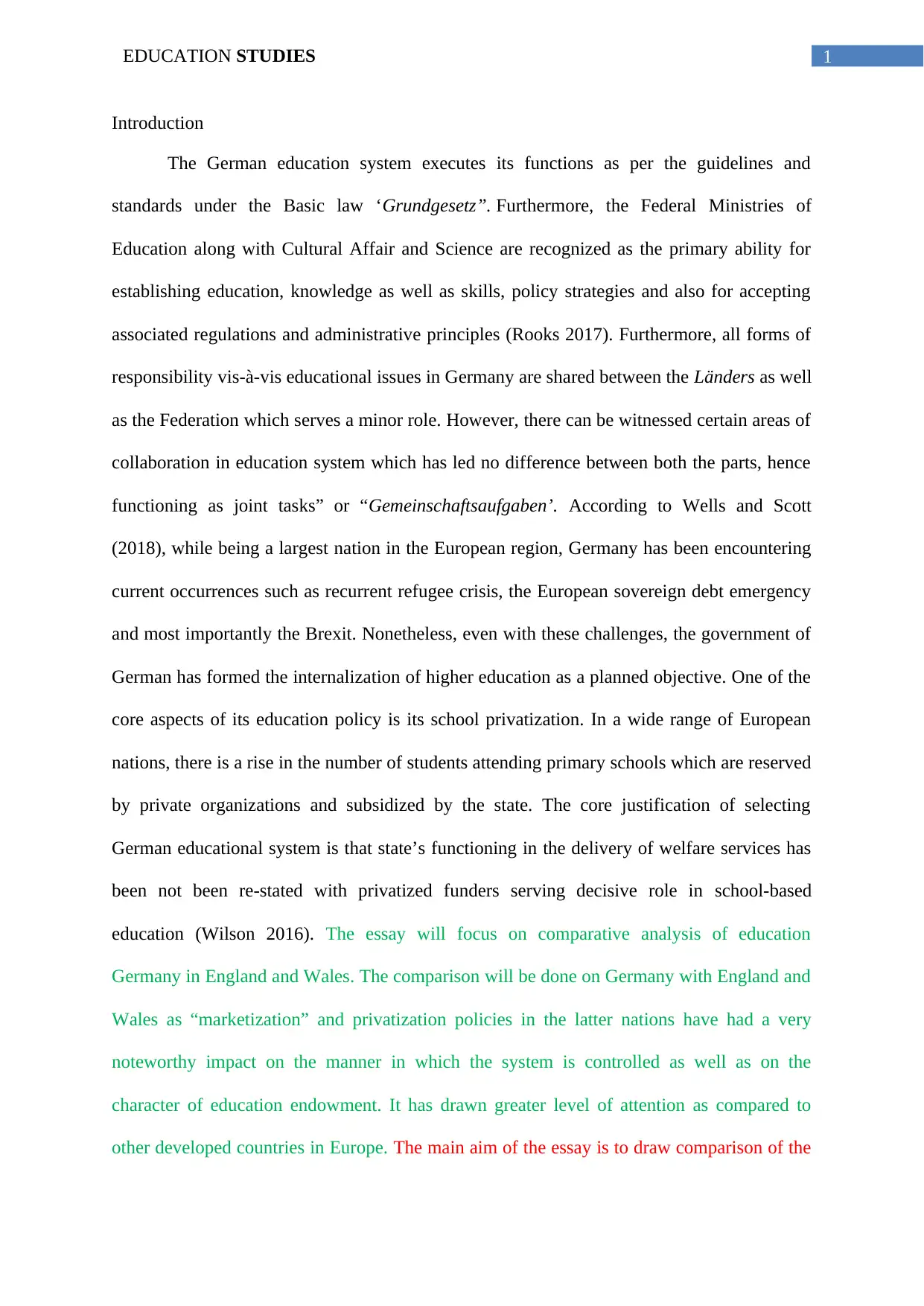
1EDUCATION STUDIES
Introduction
The German education system executes its functions as per the guidelines and
standards under the Basic law ‘Grundgesetz”. Furthermore, the Federal Ministries of
Education along with Cultural Affair and Science are recognized as the primary ability for
establishing education, knowledge as well as skills, policy strategies and also for accepting
associated regulations and administrative principles (Rooks 2017). Furthermore, all forms of
responsibility vis-à-vis educational issues in Germany are shared between the Länders as well
as the Federation which serves a minor role. However, there can be witnessed certain areas of
collaboration in education system which has led no difference between both the parts, hence
functioning as joint tasks” or “Gemeinschaftsaufgaben’. According to Wells and Scott
(2018), while being a largest nation in the European region, Germany has been encountering
current occurrences such as recurrent refugee crisis, the European sovereign debt emergency
and most importantly the Brexit. Nonetheless, even with these challenges, the government of
German has formed the internalization of higher education as a planned objective. One of the
core aspects of its education policy is its school privatization. In a wide range of European
nations, there is a rise in the number of students attending primary schools which are reserved
by private organizations and subsidized by the state. The core justification of selecting
German educational system is that state’s functioning in the delivery of welfare services has
been not been re-stated with privatized funders serving decisive role in school-based
education (Wilson 2016). The essay will focus on comparative analysis of education
Germany in England and Wales. The comparison will be done on Germany with England and
Wales as “marketization” and privatization policies in the latter nations have had a very
noteworthy impact on the manner in which the system is controlled as well as on the
character of education endowment. It has drawn greater level of attention as compared to
other developed countries in Europe. The main aim of the essay is to draw comparison of the
Introduction
The German education system executes its functions as per the guidelines and
standards under the Basic law ‘Grundgesetz”. Furthermore, the Federal Ministries of
Education along with Cultural Affair and Science are recognized as the primary ability for
establishing education, knowledge as well as skills, policy strategies and also for accepting
associated regulations and administrative principles (Rooks 2017). Furthermore, all forms of
responsibility vis-à-vis educational issues in Germany are shared between the Länders as well
as the Federation which serves a minor role. However, there can be witnessed certain areas of
collaboration in education system which has led no difference between both the parts, hence
functioning as joint tasks” or “Gemeinschaftsaufgaben’. According to Wells and Scott
(2018), while being a largest nation in the European region, Germany has been encountering
current occurrences such as recurrent refugee crisis, the European sovereign debt emergency
and most importantly the Brexit. Nonetheless, even with these challenges, the government of
German has formed the internalization of higher education as a planned objective. One of the
core aspects of its education policy is its school privatization. In a wide range of European
nations, there is a rise in the number of students attending primary schools which are reserved
by private organizations and subsidized by the state. The core justification of selecting
German educational system is that state’s functioning in the delivery of welfare services has
been not been re-stated with privatized funders serving decisive role in school-based
education (Wilson 2016). The essay will focus on comparative analysis of education
Germany in England and Wales. The comparison will be done on Germany with England and
Wales as “marketization” and privatization policies in the latter nations have had a very
noteworthy impact on the manner in which the system is controlled as well as on the
character of education endowment. It has drawn greater level of attention as compared to
other developed countries in Europe. The main aim of the essay is to draw comparison of the
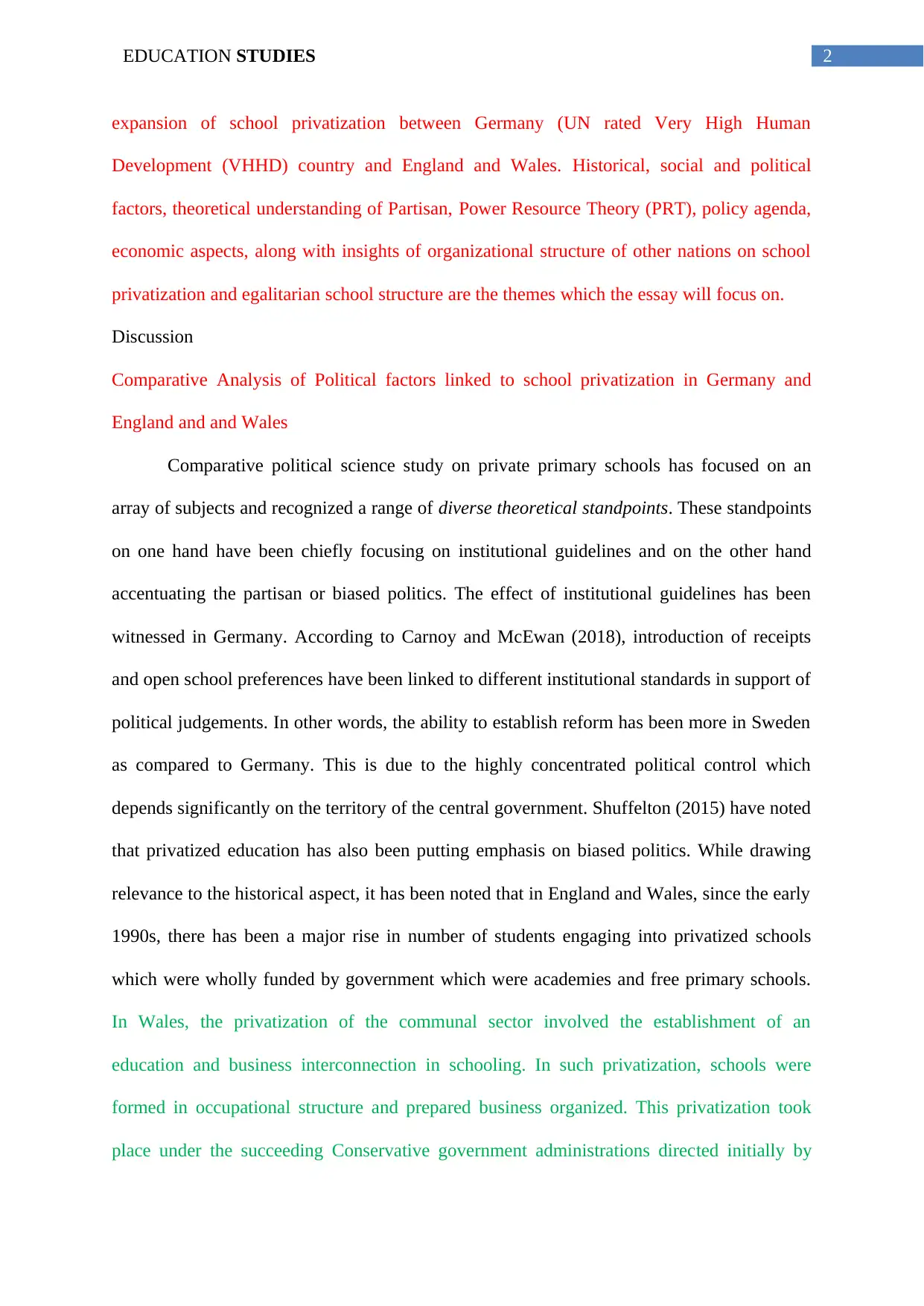
2EDUCATION STUDIES
expansion of school privatization between Germany (UN rated Very High Human
Development (VHHD) country and England and Wales. Historical, social and political
factors, theoretical understanding of Partisan, Power Resource Theory (PRT), policy agenda,
economic aspects, along with insights of organizational structure of other nations on school
privatization and egalitarian school structure are the themes which the essay will focus on.
Discussion
Comparative Analysis of Political factors linked to school privatization in Germany and
England and and Wales
Comparative political science study on private primary schools has focused on an
array of subjects and recognized a range of diverse theoretical standpoints. These standpoints
on one hand have been chiefly focusing on institutional guidelines and on the other hand
accentuating the partisan or biased politics. The effect of institutional guidelines has been
witnessed in Germany. According to Carnoy and McEwan (2018), introduction of receipts
and open school preferences have been linked to different institutional standards in support of
political judgements. In other words, the ability to establish reform has been more in Sweden
as compared to Germany. This is due to the highly concentrated political control which
depends significantly on the territory of the central government. Shuffelton (2015) have noted
that privatized education has also been putting emphasis on biased politics. While drawing
relevance to the historical aspect, it has been noted that in England and Wales, since the early
1990s, there has been a major rise in number of students engaging into privatized schools
which were wholly funded by government which were academies and free primary schools.
In Wales, the privatization of the communal sector involved the establishment of an
education and business interconnection in schooling. In such privatization, schools were
formed in occupational structure and prepared business organized. This privatization took
place under the succeeding Conservative government administrations directed initially by
expansion of school privatization between Germany (UN rated Very High Human
Development (VHHD) country and England and Wales. Historical, social and political
factors, theoretical understanding of Partisan, Power Resource Theory (PRT), policy agenda,
economic aspects, along with insights of organizational structure of other nations on school
privatization and egalitarian school structure are the themes which the essay will focus on.
Discussion
Comparative Analysis of Political factors linked to school privatization in Germany and
England and and Wales
Comparative political science study on private primary schools has focused on an
array of subjects and recognized a range of diverse theoretical standpoints. These standpoints
on one hand have been chiefly focusing on institutional guidelines and on the other hand
accentuating the partisan or biased politics. The effect of institutional guidelines has been
witnessed in Germany. According to Carnoy and McEwan (2018), introduction of receipts
and open school preferences have been linked to different institutional standards in support of
political judgements. In other words, the ability to establish reform has been more in Sweden
as compared to Germany. This is due to the highly concentrated political control which
depends significantly on the territory of the central government. Shuffelton (2015) have noted
that privatized education has also been putting emphasis on biased politics. While drawing
relevance to the historical aspect, it has been noted that in England and Wales, since the early
1990s, there has been a major rise in number of students engaging into privatized schools
which were wholly funded by government which were academies and free primary schools.
In Wales, the privatization of the communal sector involved the establishment of an
education and business interconnection in schooling. In such privatization, schools were
formed in occupational structure and prepared business organized. This privatization took
place under the succeeding Conservative government administrations directed initially by
⊘ This is a preview!⊘
Do you want full access?
Subscribe today to unlock all pages.

Trusted by 1+ million students worldwide
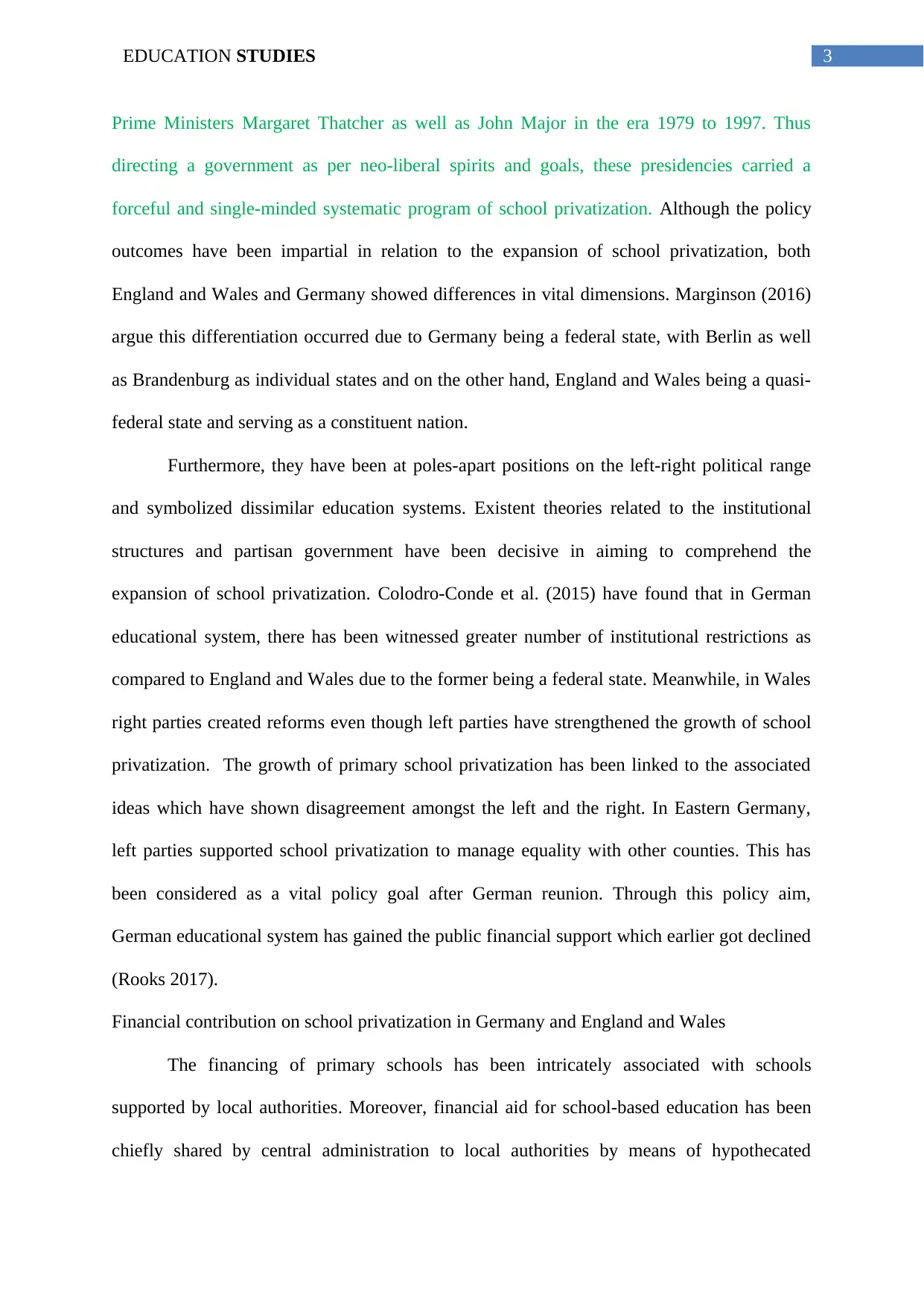
3EDUCATION STUDIES
Prime Ministers Margaret Thatcher as well as John Major in the era 1979 to 1997. Thus
directing a government as per neo-liberal spirits and goals, these presidencies carried a
forceful and single-minded systematic program of school privatization. Although the policy
outcomes have been impartial in relation to the expansion of school privatization, both
England and Wales and Germany showed differences in vital dimensions. Marginson (2016)
argue this differentiation occurred due to Germany being a federal state, with Berlin as well
as Brandenburg as individual states and on the other hand, England and Wales being a quasi-
federal state and serving as a constituent nation.
Furthermore, they have been at poles-apart positions on the left-right political range
and symbolized dissimilar education systems. Existent theories related to the institutional
structures and partisan government have been decisive in aiming to comprehend the
expansion of school privatization. Colodro-Conde et al. (2015) have found that in German
educational system, there has been witnessed greater number of institutional restrictions as
compared to England and Wales due to the former being a federal state. Meanwhile, in Wales
right parties created reforms even though left parties have strengthened the growth of school
privatization. The growth of primary school privatization has been linked to the associated
ideas which have shown disagreement amongst the left and the right. In Eastern Germany,
left parties supported school privatization to manage equality with other counties. This has
been considered as a vital policy goal after German reunion. Through this policy aim,
German educational system has gained the public financial support which earlier got declined
(Rooks 2017).
Financial contribution on school privatization in Germany and England and Wales
The financing of primary schools has been intricately associated with schools
supported by local authorities. Moreover, financial aid for school-based education has been
chiefly shared by central administration to local authorities by means of hypothecated
Prime Ministers Margaret Thatcher as well as John Major in the era 1979 to 1997. Thus
directing a government as per neo-liberal spirits and goals, these presidencies carried a
forceful and single-minded systematic program of school privatization. Although the policy
outcomes have been impartial in relation to the expansion of school privatization, both
England and Wales and Germany showed differences in vital dimensions. Marginson (2016)
argue this differentiation occurred due to Germany being a federal state, with Berlin as well
as Brandenburg as individual states and on the other hand, England and Wales being a quasi-
federal state and serving as a constituent nation.
Furthermore, they have been at poles-apart positions on the left-right political range
and symbolized dissimilar education systems. Existent theories related to the institutional
structures and partisan government have been decisive in aiming to comprehend the
expansion of school privatization. Colodro-Conde et al. (2015) have found that in German
educational system, there has been witnessed greater number of institutional restrictions as
compared to England and Wales due to the former being a federal state. Meanwhile, in Wales
right parties created reforms even though left parties have strengthened the growth of school
privatization. The growth of primary school privatization has been linked to the associated
ideas which have shown disagreement amongst the left and the right. In Eastern Germany,
left parties supported school privatization to manage equality with other counties. This has
been considered as a vital policy goal after German reunion. Through this policy aim,
German educational system has gained the public financial support which earlier got declined
(Rooks 2017).
Financial contribution on school privatization in Germany and England and Wales
The financing of primary schools has been intricately associated with schools
supported by local authorities. Moreover, financial aid for school-based education has been
chiefly shared by central administration to local authorities by means of hypothecated
Paraphrase This Document
Need a fresh take? Get an instant paraphrase of this document with our AI Paraphraser
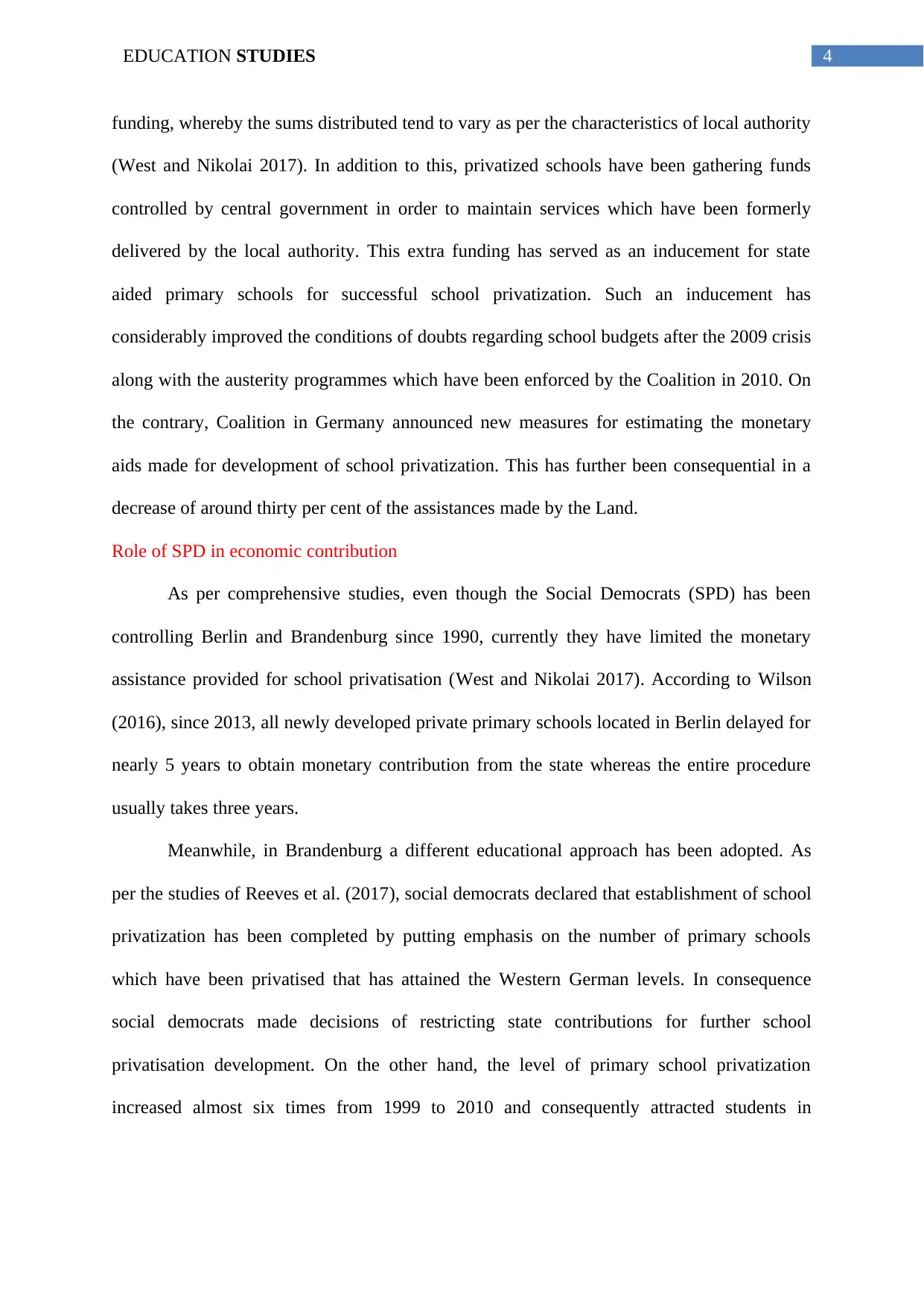
4EDUCATION STUDIES
funding, whereby the sums distributed tend to vary as per the characteristics of local authority
(West and Nikolai 2017). In addition to this, privatized schools have been gathering funds
controlled by central government in order to maintain services which have been formerly
delivered by the local authority. This extra funding has served as an inducement for state
aided primary schools for successful school privatization. Such an inducement has
considerably improved the conditions of doubts regarding school budgets after the 2009 crisis
along with the austerity programmes which have been enforced by the Coalition in 2010. On
the contrary, Coalition in Germany announced new measures for estimating the monetary
aids made for development of school privatization. This has further been consequential in a
decrease of around thirty per cent of the assistances made by the Land.
Role of SPD in economic contribution
As per comprehensive studies, even though the Social Democrats (SPD) has been
controlling Berlin and Brandenburg since 1990, currently they have limited the monetary
assistance provided for school privatisation (West and Nikolai 2017). According to Wilson
(2016), since 2013, all newly developed private primary schools located in Berlin delayed for
nearly 5 years to obtain monetary contribution from the state whereas the entire procedure
usually takes three years.
Meanwhile, in Brandenburg a different educational approach has been adopted. As
per the studies of Reeves et al. (2017), social democrats declared that establishment of school
privatization has been completed by putting emphasis on the number of primary schools
which have been privatised that has attained the Western German levels. In consequence
social democrats made decisions of restricting state contributions for further school
privatisation development. On the other hand, the level of primary school privatization
increased almost six times from 1999 to 2010 and consequently attracted students in
funding, whereby the sums distributed tend to vary as per the characteristics of local authority
(West and Nikolai 2017). In addition to this, privatized schools have been gathering funds
controlled by central government in order to maintain services which have been formerly
delivered by the local authority. This extra funding has served as an inducement for state
aided primary schools for successful school privatization. Such an inducement has
considerably improved the conditions of doubts regarding school budgets after the 2009 crisis
along with the austerity programmes which have been enforced by the Coalition in 2010. On
the contrary, Coalition in Germany announced new measures for estimating the monetary
aids made for development of school privatization. This has further been consequential in a
decrease of around thirty per cent of the assistances made by the Land.
Role of SPD in economic contribution
As per comprehensive studies, even though the Social Democrats (SPD) has been
controlling Berlin and Brandenburg since 1990, currently they have limited the monetary
assistance provided for school privatisation (West and Nikolai 2017). According to Wilson
(2016), since 2013, all newly developed private primary schools located in Berlin delayed for
nearly 5 years to obtain monetary contribution from the state whereas the entire procedure
usually takes three years.
Meanwhile, in Brandenburg a different educational approach has been adopted. As
per the studies of Reeves et al. (2017), social democrats declared that establishment of school
privatization has been completed by putting emphasis on the number of primary schools
which have been privatised that has attained the Western German levels. In consequence
social democrats made decisions of restricting state contributions for further school
privatisation development. On the other hand, the level of primary school privatization
increased almost six times from 1999 to 2010 and consequently attracted students in
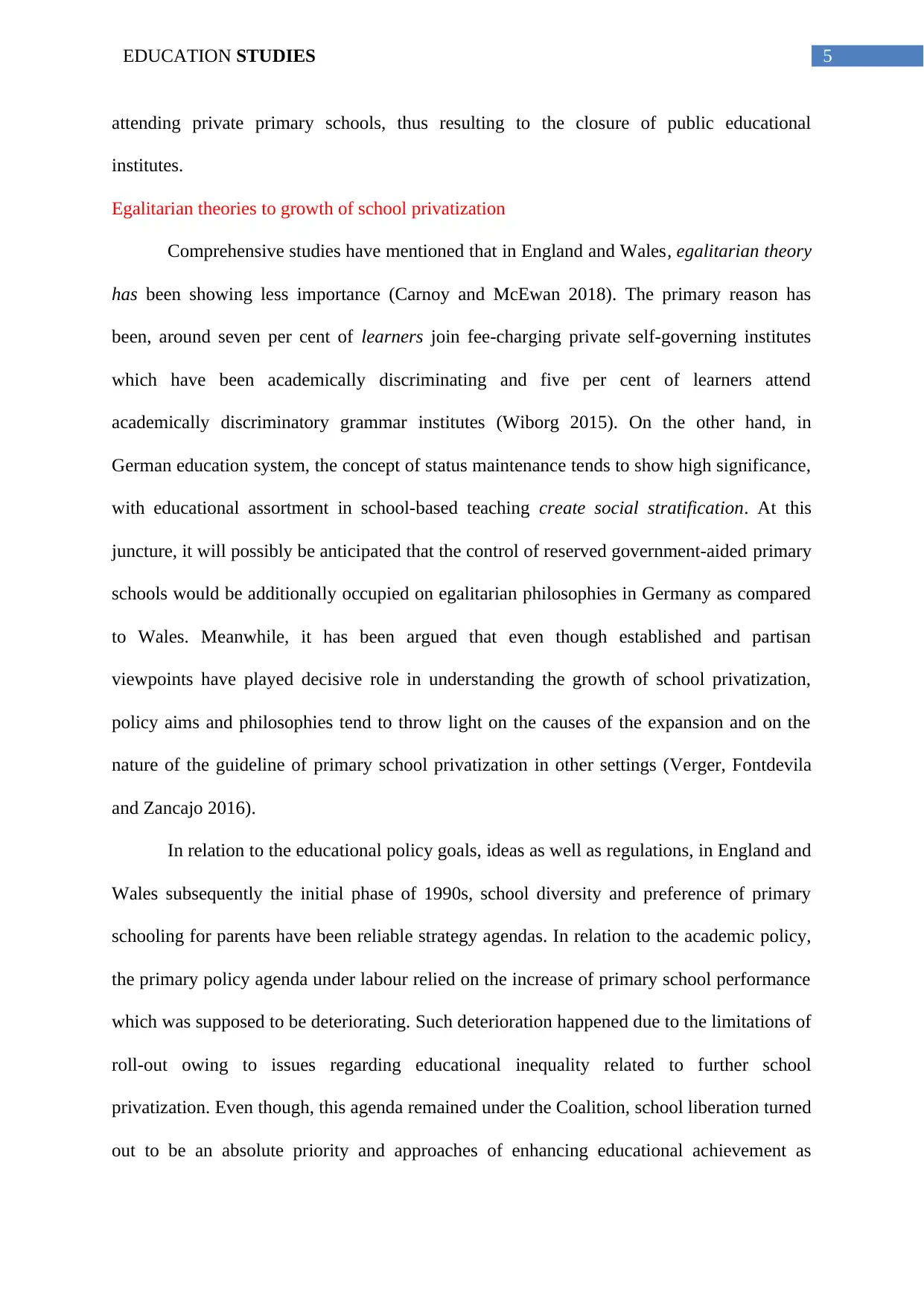
5EDUCATION STUDIES
attending private primary schools, thus resulting to the closure of public educational
institutes.
Egalitarian theories to growth of school privatization
Comprehensive studies have mentioned that in England and Wales, egalitarian theory
has been showing less importance (Carnoy and McEwan 2018). The primary reason has
been, around seven per cent of learners join fee-charging private self-governing institutes
which have been academically discriminating and five per cent of learners attend
academically discriminatory grammar institutes (Wiborg 2015). On the other hand, in
German education system, the concept of status maintenance tends to show high significance,
with educational assortment in school-based teaching create social stratification. At this
juncture, it will possibly be anticipated that the control of reserved government-aided primary
schools would be additionally occupied on egalitarian philosophies in Germany as compared
to Wales. Meanwhile, it has been argued that even though established and partisan
viewpoints have played decisive role in understanding the growth of school privatization,
policy aims and philosophies tend to throw light on the causes of the expansion and on the
nature of the guideline of primary school privatization in other settings (Verger, Fontdevila
and Zancajo 2016).
In relation to the educational policy goals, ideas as well as regulations, in England and
Wales subsequently the initial phase of 1990s, school diversity and preference of primary
schooling for parents have been reliable strategy agendas. In relation to the academic policy,
the primary policy agenda under labour relied on the increase of primary school performance
which was supposed to be deteriorating. Such deterioration happened due to the limitations of
roll-out owing to issues regarding educational inequality related to further school
privatization. Even though, this agenda remained under the Coalition, school liberation turned
out to be an absolute priority and approaches of enhancing educational achievement as
attending private primary schools, thus resulting to the closure of public educational
institutes.
Egalitarian theories to growth of school privatization
Comprehensive studies have mentioned that in England and Wales, egalitarian theory
has been showing less importance (Carnoy and McEwan 2018). The primary reason has
been, around seven per cent of learners join fee-charging private self-governing institutes
which have been academically discriminating and five per cent of learners attend
academically discriminatory grammar institutes (Wiborg 2015). On the other hand, in
German education system, the concept of status maintenance tends to show high significance,
with educational assortment in school-based teaching create social stratification. At this
juncture, it will possibly be anticipated that the control of reserved government-aided primary
schools would be additionally occupied on egalitarian philosophies in Germany as compared
to Wales. Meanwhile, it has been argued that even though established and partisan
viewpoints have played decisive role in understanding the growth of school privatization,
policy aims and philosophies tend to throw light on the causes of the expansion and on the
nature of the guideline of primary school privatization in other settings (Verger, Fontdevila
and Zancajo 2016).
In relation to the educational policy goals, ideas as well as regulations, in England and
Wales subsequently the initial phase of 1990s, school diversity and preference of primary
schooling for parents have been reliable strategy agendas. In relation to the academic policy,
the primary policy agenda under labour relied on the increase of primary school performance
which was supposed to be deteriorating. Such deterioration happened due to the limitations of
roll-out owing to issues regarding educational inequality related to further school
privatization. Even though, this agenda remained under the Coalition, school liberation turned
out to be an absolute priority and approaches of enhancing educational achievement as
⊘ This is a preview!⊘
Do you want full access?
Subscribe today to unlock all pages.

Trusted by 1+ million students worldwide
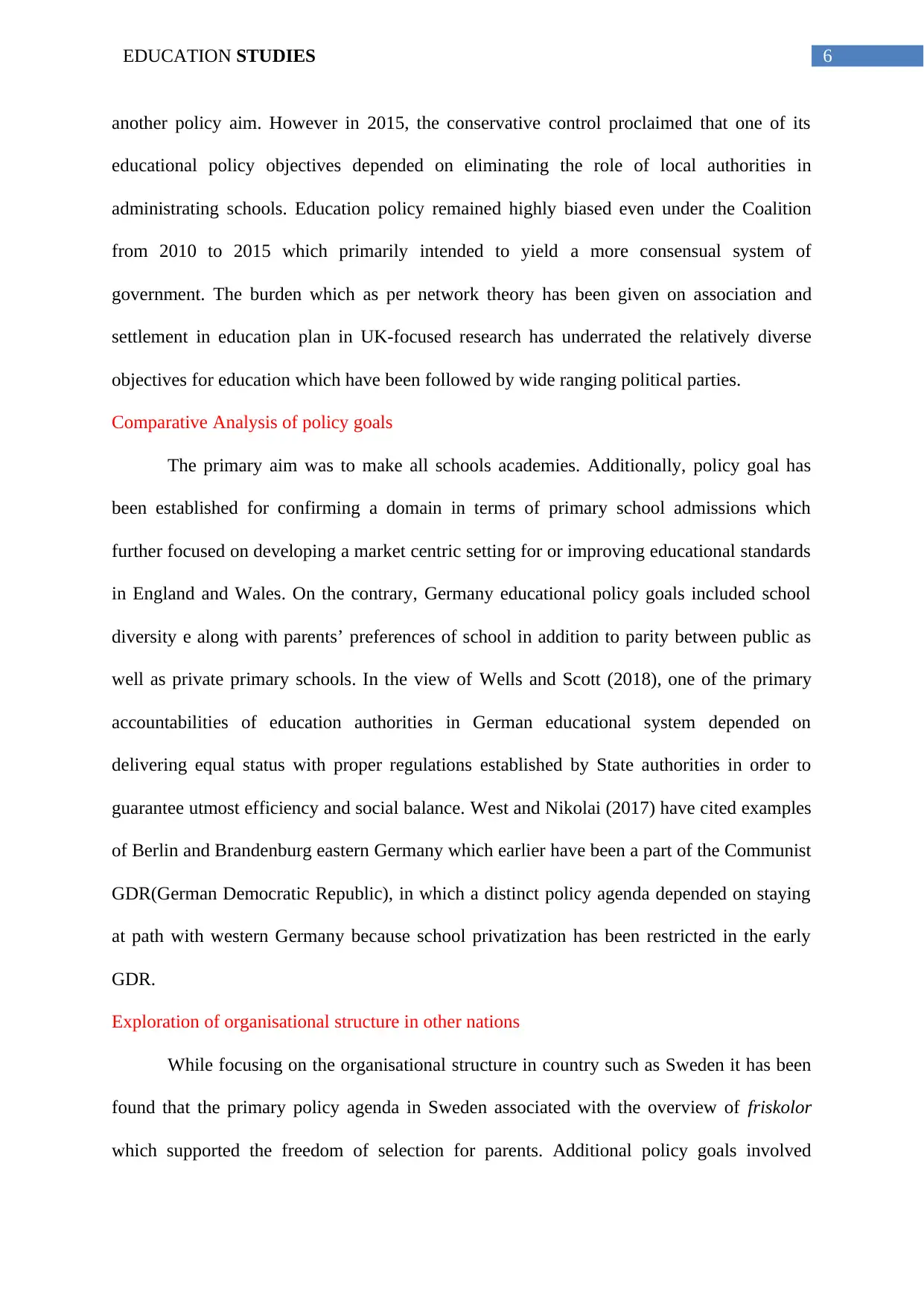
6EDUCATION STUDIES
another policy aim. However in 2015, the conservative control proclaimed that one of its
educational policy objectives depended on eliminating the role of local authorities in
administrating schools. Education policy remained highly biased even under the Coalition
from 2010 to 2015 which primarily intended to yield a more consensual system of
government. The burden which as per network theory has been given on association and
settlement in education plan in UK-focused research has underrated the relatively diverse
objectives for education which have been followed by wide ranging political parties.
Comparative Analysis of policy goals
The primary aim was to make all schools academies. Additionally, policy goal has
been established for confirming a domain in terms of primary school admissions which
further focused on developing a market centric setting for or improving educational standards
in England and Wales. On the contrary, Germany educational policy goals included school
diversity e along with parents’ preferences of school in addition to parity between public as
well as private primary schools. In the view of Wells and Scott (2018), one of the primary
accountabilities of education authorities in German educational system depended on
delivering equal status with proper regulations established by State authorities in order to
guarantee utmost efficiency and social balance. West and Nikolai (2017) have cited examples
of Berlin and Brandenburg eastern Germany which earlier have been a part of the Communist
GDR(German Democratic Republic), in which a distinct policy agenda depended on staying
at path with western Germany because school privatization has been restricted in the early
GDR.
Exploration of organisational structure in other nations
While focusing on the organisational structure in country such as Sweden it has been
found that the primary policy agenda in Sweden associated with the overview of friskolor
which supported the freedom of selection for parents. Additional policy goals involved
another policy aim. However in 2015, the conservative control proclaimed that one of its
educational policy objectives depended on eliminating the role of local authorities in
administrating schools. Education policy remained highly biased even under the Coalition
from 2010 to 2015 which primarily intended to yield a more consensual system of
government. The burden which as per network theory has been given on association and
settlement in education plan in UK-focused research has underrated the relatively diverse
objectives for education which have been followed by wide ranging political parties.
Comparative Analysis of policy goals
The primary aim was to make all schools academies. Additionally, policy goal has
been established for confirming a domain in terms of primary school admissions which
further focused on developing a market centric setting for or improving educational standards
in England and Wales. On the contrary, Germany educational policy goals included school
diversity e along with parents’ preferences of school in addition to parity between public as
well as private primary schools. In the view of Wells and Scott (2018), one of the primary
accountabilities of education authorities in German educational system depended on
delivering equal status with proper regulations established by State authorities in order to
guarantee utmost efficiency and social balance. West and Nikolai (2017) have cited examples
of Berlin and Brandenburg eastern Germany which earlier have been a part of the Communist
GDR(German Democratic Republic), in which a distinct policy agenda depended on staying
at path with western Germany because school privatization has been restricted in the early
GDR.
Exploration of organisational structure in other nations
While focusing on the organisational structure in country such as Sweden it has been
found that the primary policy agenda in Sweden associated with the overview of friskolor
which supported the freedom of selection for parents. Additional policy goals involved
Paraphrase This Document
Need a fresh take? Get an instant paraphrase of this document with our AI Paraphraser
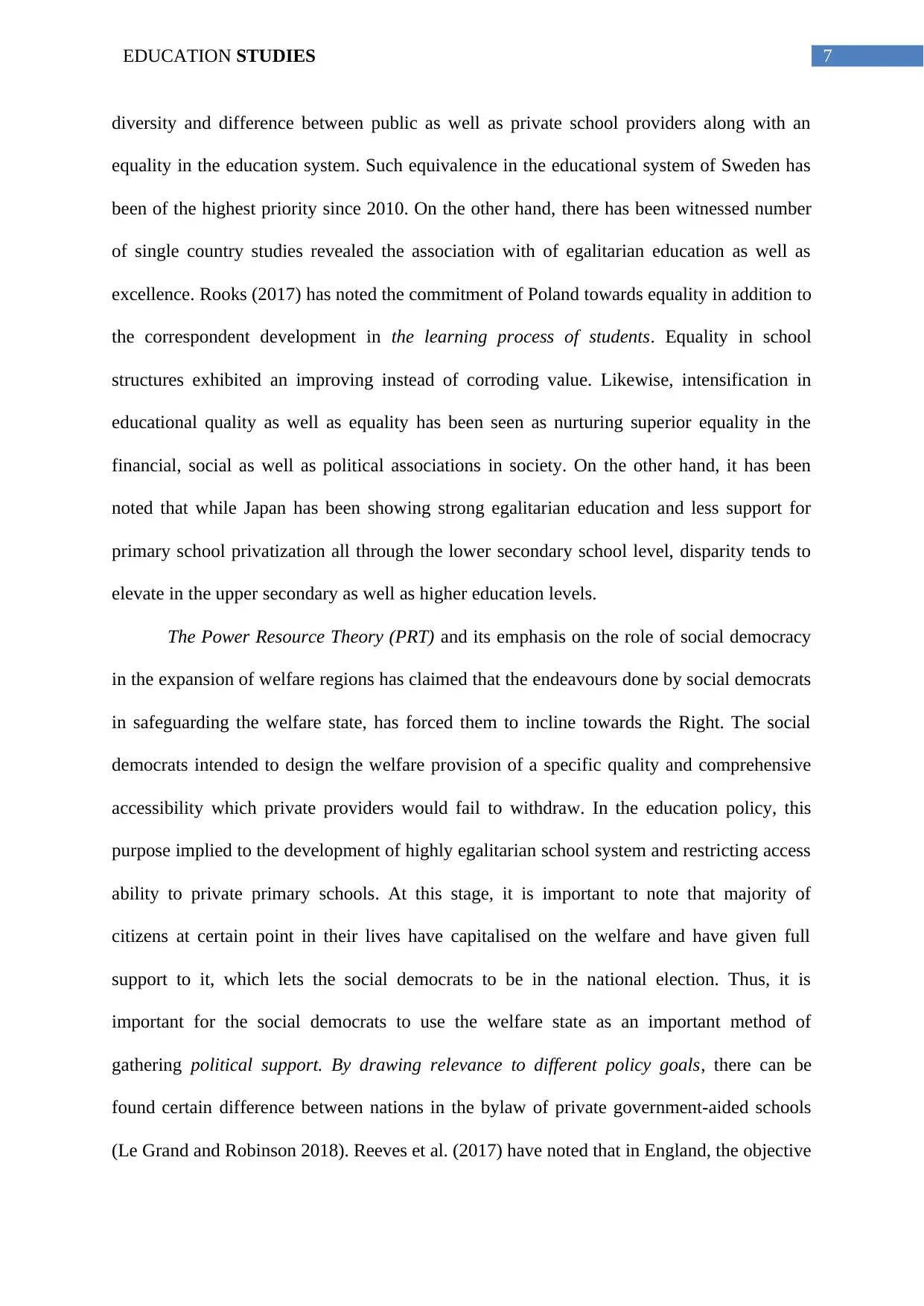
7EDUCATION STUDIES
diversity and difference between public as well as private school providers along with an
equality in the education system. Such equivalence in the educational system of Sweden has
been of the highest priority since 2010. On the other hand, there has been witnessed number
of single country studies revealed the association with of egalitarian education as well as
excellence. Rooks (2017) has noted the commitment of Poland towards equality in addition to
the correspondent development in the learning process of students. Equality in school
structures exhibited an improving instead of corroding value. Likewise, intensification in
educational quality as well as equality has been seen as nurturing superior equality in the
financial, social as well as political associations in society. On the other hand, it has been
noted that while Japan has been showing strong egalitarian education and less support for
primary school privatization all through the lower secondary school level, disparity tends to
elevate in the upper secondary as well as higher education levels.
The Power Resource Theory (PRT) and its emphasis on the role of social democracy
in the expansion of welfare regions has claimed that the endeavours done by social democrats
in safeguarding the welfare state, has forced them to incline towards the Right. The social
democrats intended to design the welfare provision of a specific quality and comprehensive
accessibility which private providers would fail to withdraw. In the education policy, this
purpose implied to the development of highly egalitarian school system and restricting access
ability to private primary schools. At this stage, it is important to note that majority of
citizens at certain point in their lives have capitalised on the welfare and have given full
support to it, which lets the social democrats to be in the national election. Thus, it is
important for the social democrats to use the welfare state as an important method of
gathering political support. By drawing relevance to different policy goals, there can be
found certain difference between nations in the bylaw of private government-aided schools
(Le Grand and Robinson 2018). Reeves et al. (2017) have noted that in England, the objective
diversity and difference between public as well as private school providers along with an
equality in the education system. Such equivalence in the educational system of Sweden has
been of the highest priority since 2010. On the other hand, there has been witnessed number
of single country studies revealed the association with of egalitarian education as well as
excellence. Rooks (2017) has noted the commitment of Poland towards equality in addition to
the correspondent development in the learning process of students. Equality in school
structures exhibited an improving instead of corroding value. Likewise, intensification in
educational quality as well as equality has been seen as nurturing superior equality in the
financial, social as well as political associations in society. On the other hand, it has been
noted that while Japan has been showing strong egalitarian education and less support for
primary school privatization all through the lower secondary school level, disparity tends to
elevate in the upper secondary as well as higher education levels.
The Power Resource Theory (PRT) and its emphasis on the role of social democracy
in the expansion of welfare regions has claimed that the endeavours done by social democrats
in safeguarding the welfare state, has forced them to incline towards the Right. The social
democrats intended to design the welfare provision of a specific quality and comprehensive
accessibility which private providers would fail to withdraw. In the education policy, this
purpose implied to the development of highly egalitarian school system and restricting access
ability to private primary schools. At this stage, it is important to note that majority of
citizens at certain point in their lives have capitalised on the welfare and have given full
support to it, which lets the social democrats to be in the national election. Thus, it is
important for the social democrats to use the welfare state as an important method of
gathering political support. By drawing relevance to different policy goals, there can be
found certain difference between nations in the bylaw of private government-aided schools
(Le Grand and Robinson 2018). Reeves et al. (2017) have noted that in England, the objective
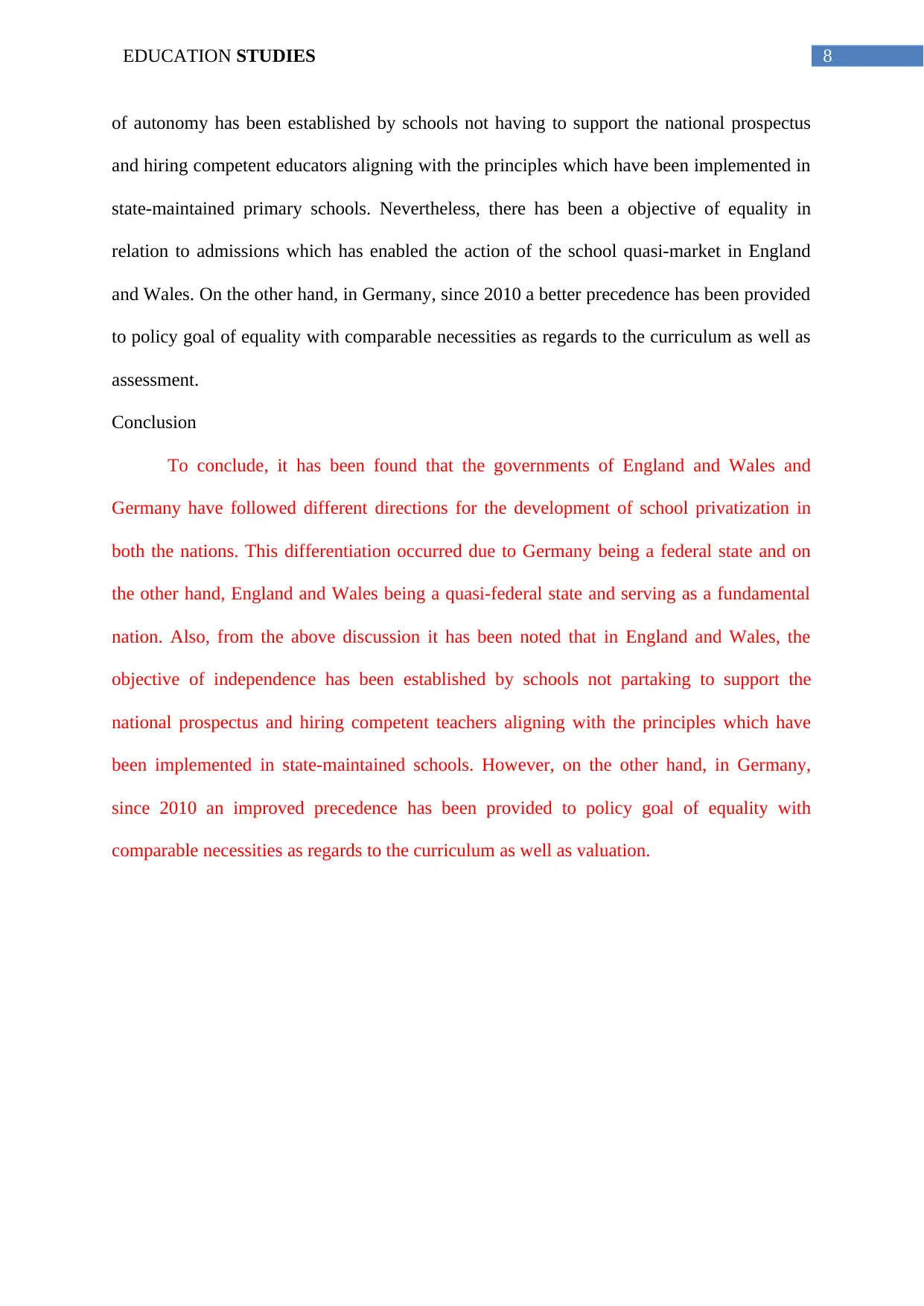
8EDUCATION STUDIES
of autonomy has been established by schools not having to support the national prospectus
and hiring competent educators aligning with the principles which have been implemented in
state-maintained primary schools. Nevertheless, there has been a objective of equality in
relation to admissions which has enabled the action of the school quasi-market in England
and Wales. On the other hand, in Germany, since 2010 a better precedence has been provided
to policy goal of equality with comparable necessities as regards to the curriculum as well as
assessment.
Conclusion
To conclude, it has been found that the governments of England and Wales and
Germany have followed different directions for the development of school privatization in
both the nations. This differentiation occurred due to Germany being a federal state and on
the other hand, England and Wales being a quasi-federal state and serving as a fundamental
nation. Also, from the above discussion it has been noted that in England and Wales, the
objective of independence has been established by schools not partaking to support the
national prospectus and hiring competent teachers aligning with the principles which have
been implemented in state-maintained schools. However, on the other hand, in Germany,
since 2010 an improved precedence has been provided to policy goal of equality with
comparable necessities as regards to the curriculum as well as valuation.
of autonomy has been established by schools not having to support the national prospectus
and hiring competent educators aligning with the principles which have been implemented in
state-maintained primary schools. Nevertheless, there has been a objective of equality in
relation to admissions which has enabled the action of the school quasi-market in England
and Wales. On the other hand, in Germany, since 2010 a better precedence has been provided
to policy goal of equality with comparable necessities as regards to the curriculum as well as
assessment.
Conclusion
To conclude, it has been found that the governments of England and Wales and
Germany have followed different directions for the development of school privatization in
both the nations. This differentiation occurred due to Germany being a federal state and on
the other hand, England and Wales being a quasi-federal state and serving as a fundamental
nation. Also, from the above discussion it has been noted that in England and Wales, the
objective of independence has been established by schools not partaking to support the
national prospectus and hiring competent teachers aligning with the principles which have
been implemented in state-maintained schools. However, on the other hand, in Germany,
since 2010 an improved precedence has been provided to policy goal of equality with
comparable necessities as regards to the curriculum as well as valuation.
⊘ This is a preview!⊘
Do you want full access?
Subscribe today to unlock all pages.

Trusted by 1+ million students worldwide
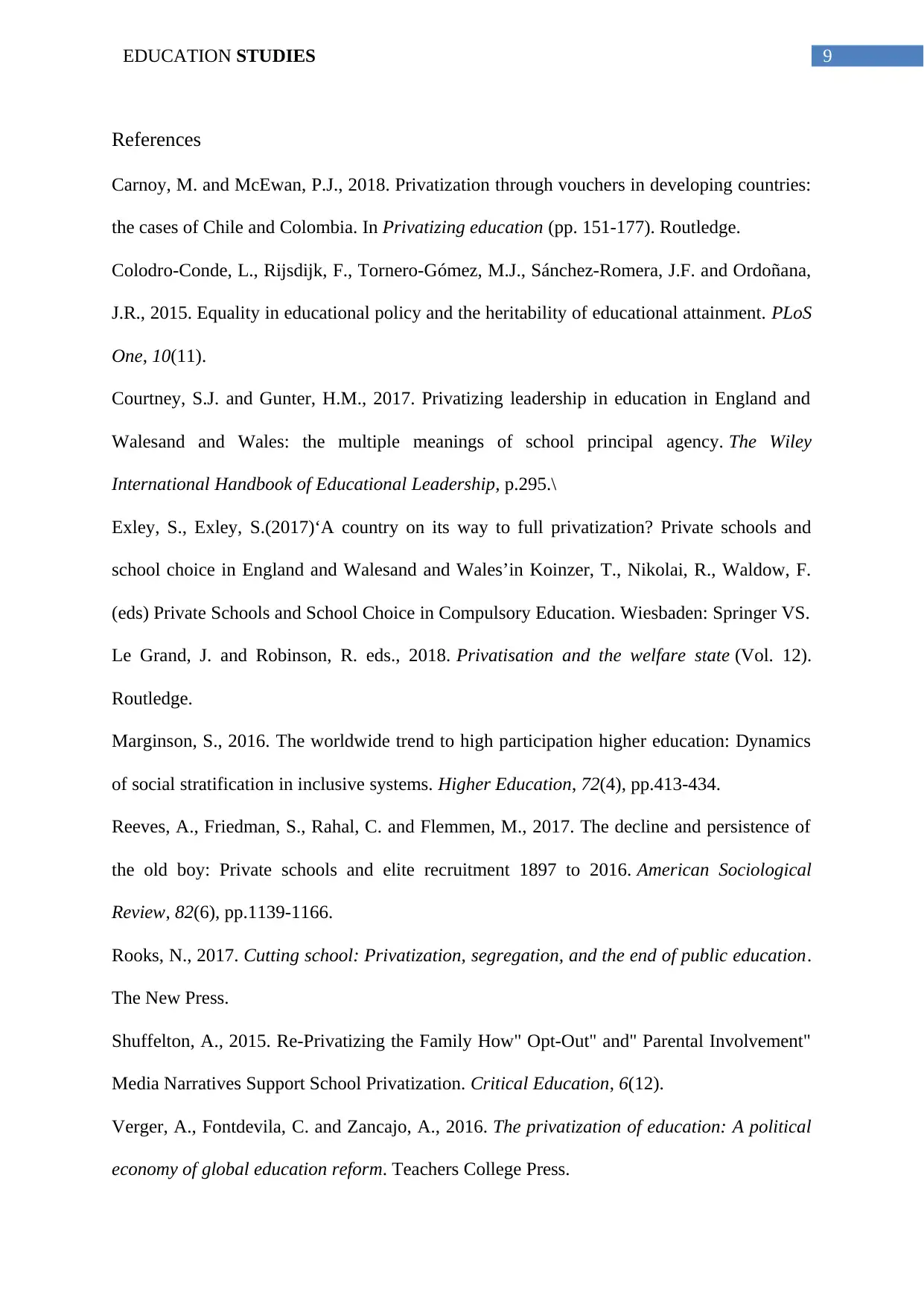
9EDUCATION STUDIES
References
Carnoy, M. and McEwan, P.J., 2018. Privatization through vouchers in developing countries:
the cases of Chile and Colombia. In Privatizing education (pp. 151-177). Routledge.
Colodro-Conde, L., Rijsdijk, F., Tornero-Gómez, M.J., Sánchez-Romera, J.F. and Ordoñana,
J.R., 2015. Equality in educational policy and the heritability of educational attainment. PLoS
One, 10(11).
Courtney, S.J. and Gunter, H.M., 2017. Privatizing leadership in education in England and
Walesand and Wales: the multiple meanings of school principal agency. The Wiley
International Handbook of Educational Leadership, p.295.\
Exley, S., Exley, S.(2017)‘A country on its way to full privatization? Private schools and
school choice in England and Walesand and Wales’in Koinzer, T., Nikolai, R., Waldow, F.
(eds) Private Schools and School Choice in Compulsory Education. Wiesbaden: Springer VS.
Le Grand, J. and Robinson, R. eds., 2018. Privatisation and the welfare state (Vol. 12).
Routledge.
Marginson, S., 2016. The worldwide trend to high participation higher education: Dynamics
of social stratification in inclusive systems. Higher Education, 72(4), pp.413-434.
Reeves, A., Friedman, S., Rahal, C. and Flemmen, M., 2017. The decline and persistence of
the old boy: Private schools and elite recruitment 1897 to 2016. American Sociological
Review, 82(6), pp.1139-1166.
Rooks, N., 2017. Cutting school: Privatization, segregation, and the end of public education.
The New Press.
Shuffelton, A., 2015. Re-Privatizing the Family How" Opt-Out" and" Parental Involvement"
Media Narratives Support School Privatization. Critical Education, 6(12).
Verger, A., Fontdevila, C. and Zancajo, A., 2016. The privatization of education: A political
economy of global education reform. Teachers College Press.
References
Carnoy, M. and McEwan, P.J., 2018. Privatization through vouchers in developing countries:
the cases of Chile and Colombia. In Privatizing education (pp. 151-177). Routledge.
Colodro-Conde, L., Rijsdijk, F., Tornero-Gómez, M.J., Sánchez-Romera, J.F. and Ordoñana,
J.R., 2015. Equality in educational policy and the heritability of educational attainment. PLoS
One, 10(11).
Courtney, S.J. and Gunter, H.M., 2017. Privatizing leadership in education in England and
Walesand and Wales: the multiple meanings of school principal agency. The Wiley
International Handbook of Educational Leadership, p.295.\
Exley, S., Exley, S.(2017)‘A country on its way to full privatization? Private schools and
school choice in England and Walesand and Wales’in Koinzer, T., Nikolai, R., Waldow, F.
(eds) Private Schools and School Choice in Compulsory Education. Wiesbaden: Springer VS.
Le Grand, J. and Robinson, R. eds., 2018. Privatisation and the welfare state (Vol. 12).
Routledge.
Marginson, S., 2016. The worldwide trend to high participation higher education: Dynamics
of social stratification in inclusive systems. Higher Education, 72(4), pp.413-434.
Reeves, A., Friedman, S., Rahal, C. and Flemmen, M., 2017. The decline and persistence of
the old boy: Private schools and elite recruitment 1897 to 2016. American Sociological
Review, 82(6), pp.1139-1166.
Rooks, N., 2017. Cutting school: Privatization, segregation, and the end of public education.
The New Press.
Shuffelton, A., 2015. Re-Privatizing the Family How" Opt-Out" and" Parental Involvement"
Media Narratives Support School Privatization. Critical Education, 6(12).
Verger, A., Fontdevila, C. and Zancajo, A., 2016. The privatization of education: A political
economy of global education reform. Teachers College Press.
Paraphrase This Document
Need a fresh take? Get an instant paraphrase of this document with our AI Paraphraser
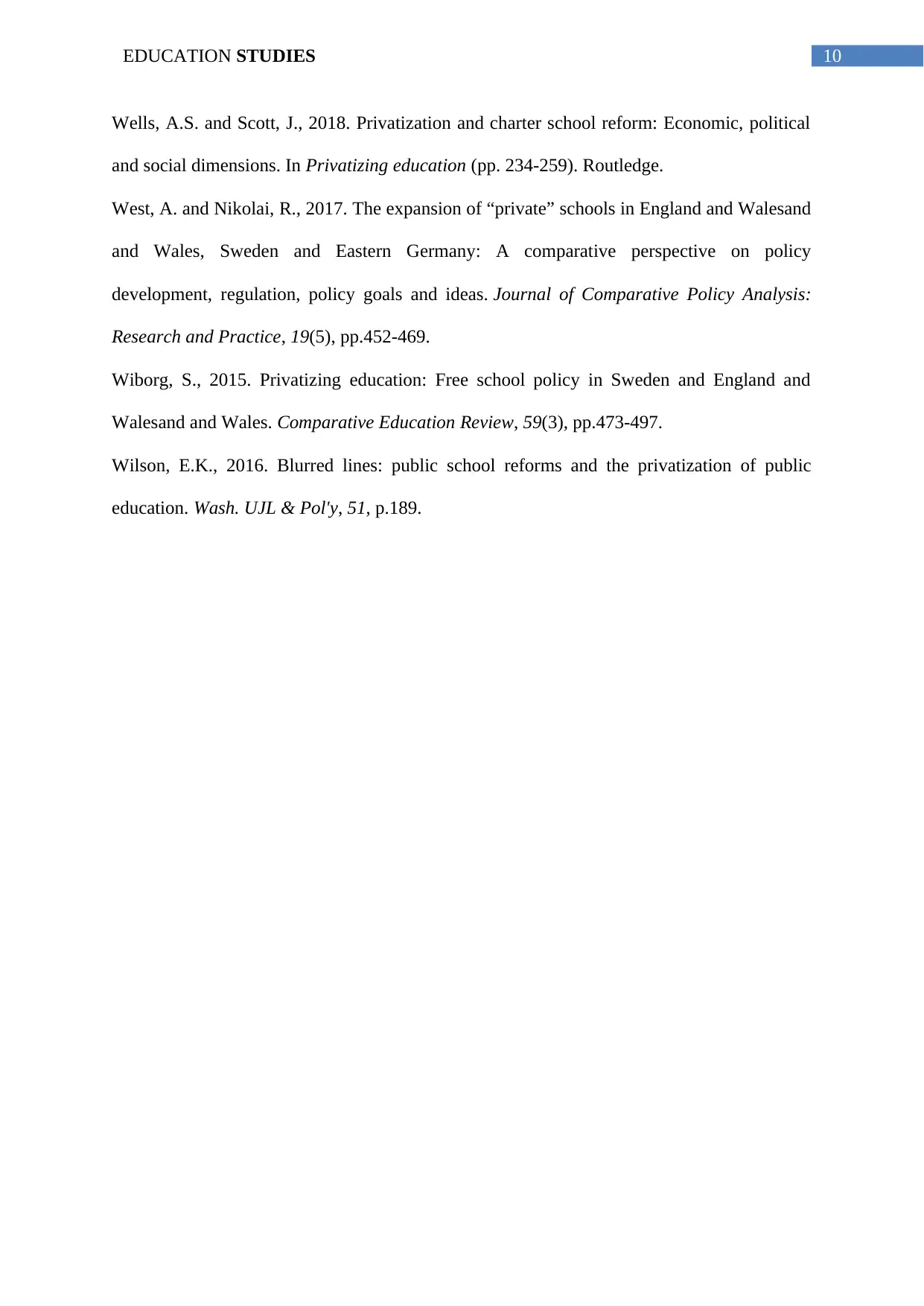
10EDUCATION STUDIES
Wells, A.S. and Scott, J., 2018. Privatization and charter school reform: Economic, political
and social dimensions. In Privatizing education (pp. 234-259). Routledge.
West, A. and Nikolai, R., 2017. The expansion of “private” schools in England and Walesand
and Wales, Sweden and Eastern Germany: A comparative perspective on policy
development, regulation, policy goals and ideas. Journal of Comparative Policy Analysis:
Research and Practice, 19(5), pp.452-469.
Wiborg, S., 2015. Privatizing education: Free school policy in Sweden and England and
Walesand and Wales. Comparative Education Review, 59(3), pp.473-497.
Wilson, E.K., 2016. Blurred lines: public school reforms and the privatization of public
education. Wash. UJL & Pol'y, 51, p.189.
Wells, A.S. and Scott, J., 2018. Privatization and charter school reform: Economic, political
and social dimensions. In Privatizing education (pp. 234-259). Routledge.
West, A. and Nikolai, R., 2017. The expansion of “private” schools in England and Walesand
and Wales, Sweden and Eastern Germany: A comparative perspective on policy
development, regulation, policy goals and ideas. Journal of Comparative Policy Analysis:
Research and Practice, 19(5), pp.452-469.
Wiborg, S., 2015. Privatizing education: Free school policy in Sweden and England and
Walesand and Wales. Comparative Education Review, 59(3), pp.473-497.
Wilson, E.K., 2016. Blurred lines: public school reforms and the privatization of public
education. Wash. UJL & Pol'y, 51, p.189.
1 out of 11
Related Documents
Your All-in-One AI-Powered Toolkit for Academic Success.
+13062052269
info@desklib.com
Available 24*7 on WhatsApp / Email
![[object Object]](/_next/static/media/star-bottom.7253800d.svg)
Unlock your academic potential
Copyright © 2020–2026 A2Z Services. All Rights Reserved. Developed and managed by ZUCOL.




